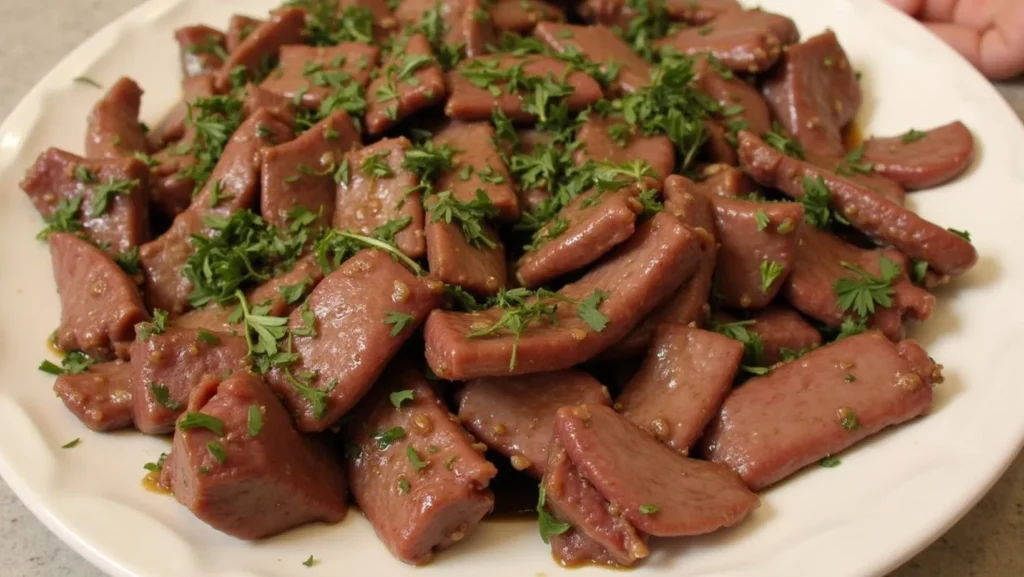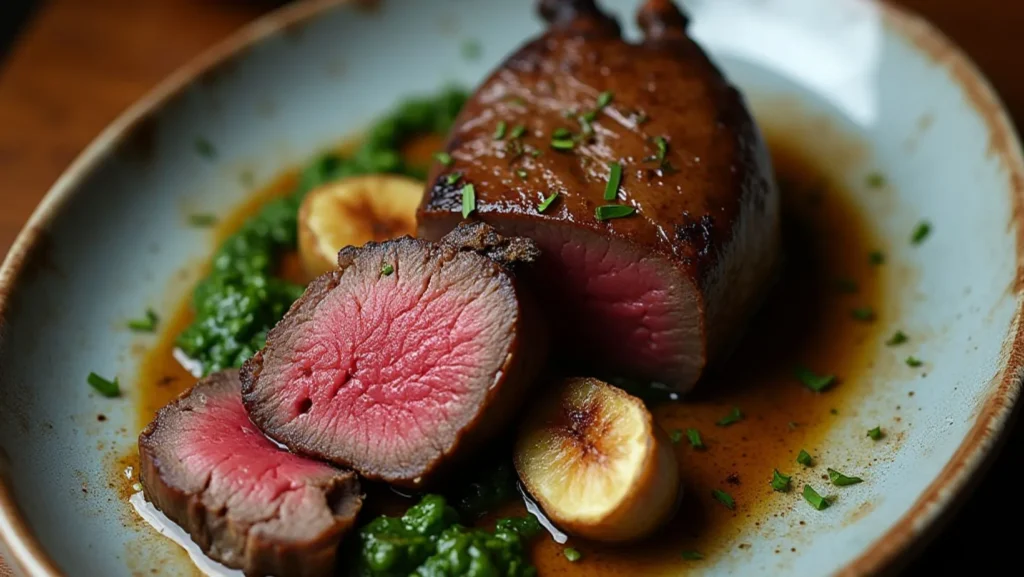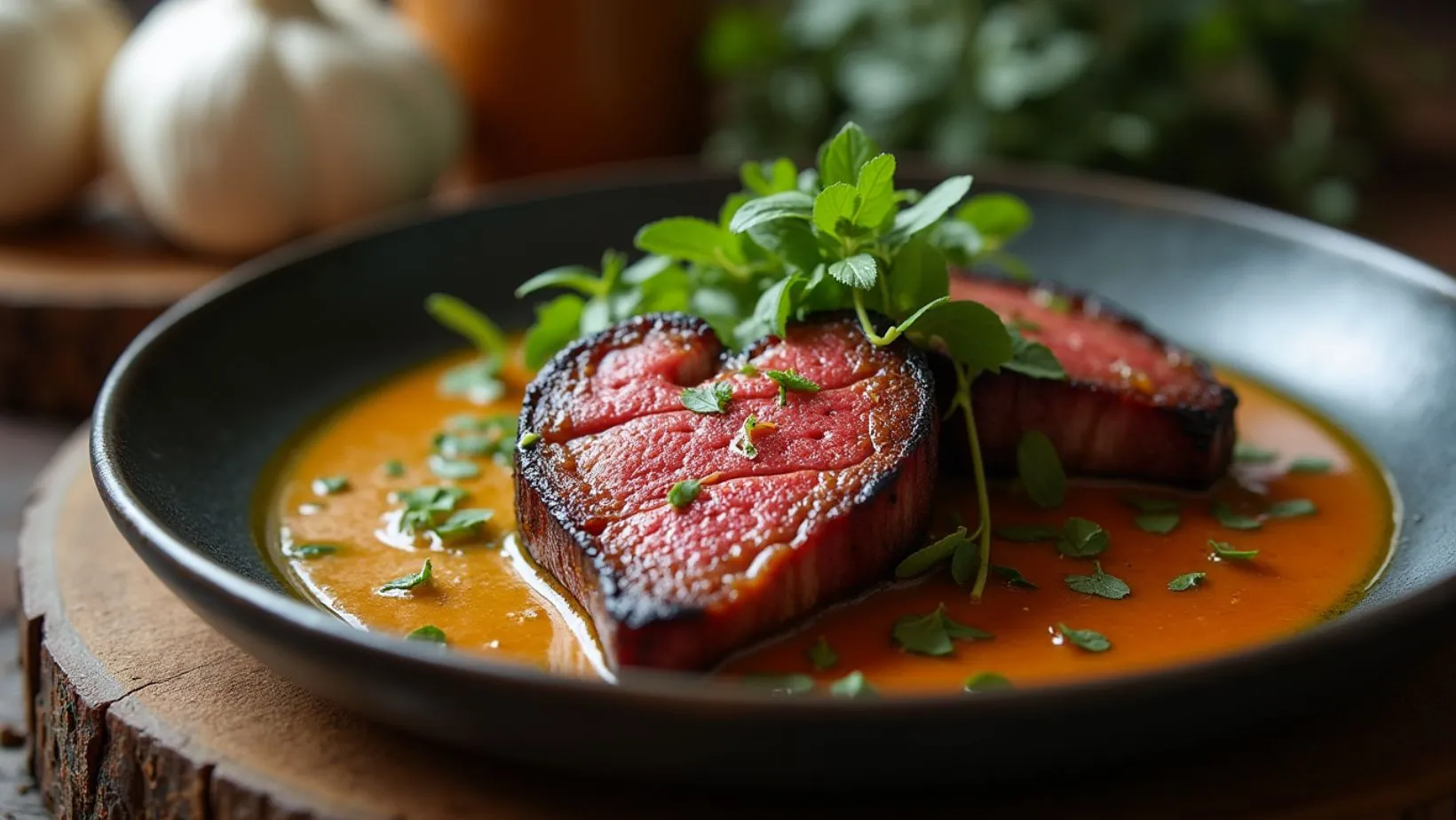Delicious Beef Heart Recipe: A Tender Organ Meat Dish
I’ve always been drawn to the variety of organ meats in cooking. Beef heart is one that stands out, with its bold yet complex flavors. My grandmother’s beef heart dishes were tender and full of flavor. The smell of her cooking still brings back warm memories.
In this article, we’ll dive into the joys of cooking with beef heart. It’s a nutritious and often overlooked ingredient that’s worth trying. This recipe is perfect for anyone looking to explore offal cuisine. With the right techniques, you can make a dish that’s both nourishing and soulful.
Table of Contents
Key Takeaways
- Beef Heart Recipe is a nutritious and budget-friendly organ meat that offers a unique and delicious flavor profile.
- Proper preparation and cooking techniques are essential to achieving a tender and flavorful beef heart dish.
- Embracing nose-to-tail eating and utilizing the entire animal is a sustainable and eco-friendly approach to cooking.
- This recipe provides a step-by-step guide for cleaning, trimming, and cooking beef heart to perfection.
- Experimenting with marinades and seasonings can enhance the natural flavors of the beef heart.
Understanding Beef Heart: A Nutritious Organ Meat
Beef heart is a nutritional gem in the world of organ meats. It’s packed with essential nutrients and adds flavor to traditional beef dishes. Explore the benefits of beef heart and see why it’s a must-have in your kitchen.
Key Nutritional Benefits of Heart Meat
Beef heart is a nutritional powerhouse. It’s a great source of high-quality protein and B vitamins like vitamin B12 and niacin. These nutrients are key for energy and overall health.
Zinc and iron are also abundant in it. Zinc strengthens the immune system and promotes healing, while iron aids in the production of red blood cells. Beef heart is a fantastic addition to your diet because it contains these nutrients.
Why Choose Beef Heart for Cooking
Beef heart is not only nutritious but also affordable. It’s a budget-friendly option for home cooks.
Its unique flavor and tender texture make it stand out. It can add depth to many traditional beef recipes. Whether in stews, skewers, or new dishes, beef heart can enhance your meals.

“More culinary attention should be paid to beef heart since it is a nutrient-dense organ meat. Given its potent flavor and exceptional nutritional profile, it is a fantastic addition to any cook’s toolkit.”
Essential Tools and Ingredients for Beef Heart Preparation
Cooking beef heart needs some key tools and ingredients for great results. Whether you’re a pro or new to beef offal recipes, the right stuff makes a big difference. It helps you make a tasty and tender dish.
Necessary Kitchen Tools
- A sharp, high-quality chef’s knife for precise trimming and slicing
- A strong cutting board to give your preparation work a level surface
- Tongs or a fork to handle the beef heart during the cleaning and cooking process
- To aid in breaking down the tough muscle fibers, use a meat mallet or tenderizer (optional).
- A slow cooker or Instant Pot for easy and hands-off cooking methods (if desired)
Essential Ingredients
You’ll also need some basic seasonings and ingredients for flavor:
- Salt and pepper to season the heart and enhance its natural flavors
- Garlic, onions, or shallots to provide aromatic depth
- Spices and herbs to add depth, such paprika, rosemary, or thyme
- Cooking oil or fat to sear or braise the heart
- Liquids like broth, wine, or vinegar for braising or marinading
Feel free to try marinades, rubs, or sauces to make the beef heart your own. The world of cooking beef heart and beef offal recipes is full of possibilities.

| Kitchen Tool | Purpose |
|---|---|
| Sharp Chef’s Knife | Precise trimming and slicing of the beef heart |
| Cutting Board | Stable surface for preparing the beef heart |
| Tongs or Fork | Handling the beef heart during cleaning and cooking |
| Meat Mallet | Tenderizing the tough muscle fibers of the beef heart |
| Slow Cooker or Instant Pot | Convenient cooking methods for tender beef heart dishes |
How to Clean and Trim Your Beef Heart
Getting a beef heart ready for cooking starts with cleaning and trimming. Follow these steps for the best heart meat preparation.
Proper Cleaning Techniques
Rinse the beef heart under cold water first. Use your fingers or a small knife to remove blood clots. Then, dry it with paper towels before moving on.
Trimming Methods for Perfect Cuts
Cut out extra fat and connective tissue using a sharp knife. To ensure even cooking, make sure the parts are uniform. Take off the stiff outer membrane and any arteries or valves that are visible.
Removing Unwanted Tissues
- Slice the beef heart in half lengthwise to expose the interior.
- Carefully cut out and discard the valves, connective tissues, and any discolored or tough areas.
- Divide the remaining heart meat into your desired portion sizes, ensuring each piece is similar in thickness for even cooking.
With these heart meat preparation techniques, you’ll have a beef heart ready for a tasty and healthy meal.
The Perfect Beef Heart Recipe for Beginners
Exploring beef heart cooking can be thrilling, especially for new cooks. This easy beef heart recipe is great for beginners. It uses simple ingredients and clear steps to make a tasty dish that highlights the heart’s unique taste and softness.
Ingredients:
- 1 beef heart, cleaned and trimmed
- 2 tablespoons olive oil
- 1 onion, diced
- 3 cloves garlic, minced
- 1 cup beef broth
- 2 tablespoons Worcestershire sauce
- 1 teaspoon dried thyme
- Salt and black pepper to taste
Instructions:
- Preheat your oven to 350°F (175°C).
- In a large oven-safe pan or Dutch oven, heat the olive oil over medium-high heat.
- Add the diced onion and minced garlic to the pan, and sauté until fragrant and translucent, about 5 minutes.
- Place the cleaned and trimmed beef heart into the pan with the onions and garlic.
- Top with the dried thyme and pour in the Worcestershire sauce and beef broth.
- Season with salt and black pepper to taste.
- Cover the pan and transfer it to the preheated oven.
- Roast the beef heart for 2-3 hours, or until it’s tender and easily sliced.
- Remove the pan from the oven and let the beef heart rest for 10 minutes before slicing and serving.
For a twist, use red wine instead of beef broth for a richer flavor. Or mix broth and wine for a complex taste. You can also sear the heart before roasting for a crispy crust.
“This beef heart recipe is a game-changer for anyone looking to explore the world of organ meats. The tender, flavorful results are sure to win over even the most skeptical of eaters.”
Enjoy this beef heart dish with your favorite sides like roasted veggies, mashed potatoes, or a fresh salad. It’s a satisfying and healthy meal that will quickly become a family favorite.
Marinades and Seasonings That Enhance Heart Meat
Choosing the right marinade and seasonings can really boost the taste of beef heart. Try these classic and modern options to make your offal cuisine stand out.
Classic Marinade Options
A quality marinade adds flavor and tenderizes the meat. The following are some traditional marinade recipes for heart meat:
- Red wine marinade: Mix red wine, garlic, rosemary, and thyme for a savory taste.
- Citrus-based marinade: Use orange or lemon juice, olive oil, soy sauce, and herbs for a tangy flavor.
- Yogurt marinade: The acidity of the yogurt softens the meat. For a Middle Eastern flair, add garlic, cumin, and coriander.
Spice Combinations for Maximum Flavor
Heart meat is great for bold spice blends. Try these spice mixes to boost your beef heart dishes:
- Smoky and savory: Mix smoked paprika, garlic powder, onion powder, and brown sugar for a rich flavor.
- Earthy and aromatic: Combine cumin, coriander, cardamom, and ginger for warm, fragrant notes.
- Herbaceous and zesty: Blend rosemary, thyme, oregano, and lemon zest for a bright taste.
Experiment with marinades and seasonings to bring out the best in beef heart. Adjust flavors to your taste, and let the heart meat absorb all the delicious flavors.
Cooking Methods: From Grilling to Slow-Cooking
There are many ways to cook cooking beef heart and each method brings out unique flavors and textures. This makes beef offal recipes both nutritious and delicious. Let’s explore the good and bad of some popular cooking methods for beef heart.
Grilling Beef Heart
Grilling adds a smoky, charred taste to beef heart. The high heat creates a flavorful crust while keeping the inside tender. But, it’s crucial to watch the cooking time to avoid toughness.
Pan-Searing Beef Heart
Pan-searing is quick and easy. It creates a nice browning on the outside while keeping the inside moist. Use a hot pan and good oil for the best sear.
Braising Beef Heart
Braising makes beef heart tender and flavorful. First, sear the heart, then simmer it in a tasty liquid like broth or wine. This way, it becomes very tender.
Slow-Cooking Beef Heart
Slow-cooking makes beef heart tender and juicy. This method breaks down connective tissues, making it soft. Whether in a slow cooker or oven, it’s a simple way to get great results.
Whichever method you pick, always check the heart’s internal temperature. This ensures it’s cooked just right. With a bit of trial and error, you’ll find the best way to cook cooking beef heart for your taste.
Tips for Achieving Tender and Juicy Results
Cooking a tasty beef heart recipe means getting the texture and juiciness right. Here are some tips to make your heart meat tender and juicy.
Temperature Control Guidelines
Getting the temperature right is key for a perfect beef heart. Aim for an internal temperature of 145°F (62.8°C) for medium-rare. For a well-done heart, go up to 160°F (71.1°C). Use a meat thermometer to check the temperature and avoid overcooking, which makes the meat dry and tough.
Resting and Serving Recommendations
Allow your beef heart to rest for five to ten minutes after it has been cooked to the proper doneness. The meat becomes tender and tasty as a result of the liquids spreading evenly. For the greatest texture, cut the heart against the grain.
By controlling the temperature and letting the meat rest, you’ll get a beef heart recipe that’s tender and juicy. This showcases the heart’s unique and delicious flavor.
Pairing Suggestions and Side Dish Ideas
Enjoying a delicious beef heart dish is even better with the right sides and drinks. Here are some tasty ideas to match the bold flavors of organ meat dishes.
Hearty Side Dish Options
- Roasted root vegetables like carrots, parsnips, and potatoes add an earthy touch to beef heart.
- Creamy mashed potatoes or polenta offer a comforting contrast.
- Nutty, chewy farro or quinoa are great whole-grain sides.
- Sautéed greens like kale or Swiss chard bring a fresh taste.
Beverage Pairings
- A full-bodied red wine, like Cabernet Sauvignon or Malbec, pairs well with beef heart.
- Try a crisp white wine, such as Pinot Grigio or Sauvignon Blanc, for a lighter choice.
- Craft beers with nutty, caramel notes, like brown ale or porter, are also great choices.
Be creative with leftover beef heart. Use it in traditional beef recipes like stews, shepherd’s pie, or tacos. This versatile organ meat can be enjoyed in many tasty ways.
| Side Dish | Wine Pairing | Beer Pairing |
|---|---|---|
| Roasted Vegetables | Cabernet Sauvignon | Brown Ale |
| Mashed Potatoes | Malbec | Porter |
| Farro Salad | Sauvignon Blanc | Pilsner |
Try these pairings and side dishes to make your beef heart dish unforgettable. Enjoy the rich meat with flavors and textures that will delight your taste buds.
Conclusion
Preparing and cooking beef heart is a fun culinary journey. It offers many benefits. By learning about its nutritional value and how to cook it, you can make your meals better.
Embracing nose-to-tail eating is good for the planet and your taste buds. It lets you try different cuts that are full of flavor and nutrients. The recipes and tips in this guide will help you get started with beef heart.
So, give beef heart a try. With the right steps and creativity, you’ll make a dish that’s tender, tasty, and healthy. It will surely impress your loved ones. Bon appétit!

